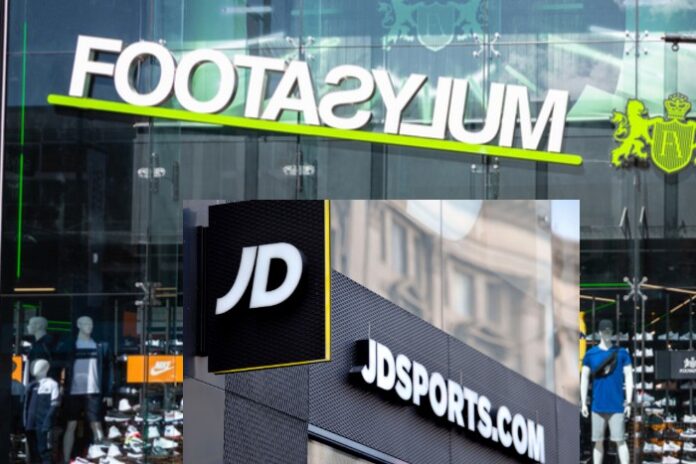

// CMA blocks JD Sports’ move to buy rival Footasylum for £90m
// CMA says it would lead to a substantial lessening of competition & fewer discounts
// JD Sports “fundamentally disagrees” with the decision, accusing CMA of failing to understand the retail landscape
The UK’s peak competition watchdog authority has blocked JD Sports’ move to buy rival Footasylum for £90 million, 14 months after the takeover deal was first agreed.
Following an in-depth Phase II investigation, the CMA concluded that the takeover would lead to “a substantial lessening of competition”.
It said shoppers would be left with “fewer discounts or receiving lower quality customer service”.
READ MORE:
In reaching this final decision, the CMA said it analysed a wide range of evidence looking at how closely JD Sports and Footasylum firms compete as well as competition from other retailers, and the constraint from suppliers like Nike and Adidas.
The CMA said evidence included more than 2000 of the companies’ own internal strategy and decision-making documents, which showed that JD Sports and Footasylum monitor each other’s activity closely.
The CMA also conducted two large surveys of more than 10,000 of the retailers’ customers, which found that JD Sports shoppers saw Footasylum as their next best alternative or vice-versa.
The competition authority also determined that Footasylum store openings negatively impacted footwear and clothing sales at nearby JD Sports stores.
“The evidence generally showed a consistent picture: JD Sports and Footasylum are close competitors,” the CMA said.
The watchdog added that both JD Sports and Footasylum are among a small number of retailers that sell the latest sports-inspired casual footwear and clothing across the UK, but after examining the level of competition from other rivals in the sector it found that it was not sufficient to stop shoppers being worse off after the merger.
As a result, the CMA said its independent inquiry groups decided that the only way to address the competition concerns was for JD Sports to sell Footasylum in full – to an approved buyer.
“This deal would mean the removal of a direct competitor from the market, leaving customers worse off,” CMA inquiry group chairman Kip Meek said.
“Based on the evidence we have seen, blocking the deal is the only way to ensure they are protected.
“This decision comes at a very difficult time for retailers and we have been careful to consider the effects of coronavirus.
“However, we need to make sure we think about the impact of this merger on shoppers, both now and in the foreseeable future and we do not see the effects of the current crisis changing the competitive dynamics in a way that diminishes the substantial lessening of competition which we need to remedy.
“We never take decisions to block mergers lightly, but in this case the evidence has shown it is necessary for JD Sports to sell Footasylum, so that they can continue to compete against each other as independent businesses.”
JD Sports hit back at the CMA’s final report, saying that it “materially fails to take proper account of the dynamic and rapidly evolving competitive landscape” in which the retailers operate.
With direct competitors such as Sports Direct elevating its propositions to compete even more closely with JD Sports, alongside the marked acceleration in Adidas and Nike’s direct-to-consumer growth strategies, JD Sport said the CMA “failed to properly understand” these trends and “completely dismissed” any evidence which goes against their “prejudged and erroneous interpretation” of the sportswear retail sector.
JD Sports also suggested that Footasylum’s “weakened financial position” in the wake of the coronavirus pandemic may mean it would not be enough to attract a buyer as per the CMA’s instructions, and warned it could exit the market completely.
This downward trend is especially pertinent for Footasylum, which was in a weakened financial position at the time of the acquisition, is heavily dependent on sales from its physical store estate, and which, without JD’s financial backing, may well have been forced to exit the market, joining the long list of retail casualties we’ve already seen during the current crisis.
“We fundamentally disagree with the CMA’s decision, which continues to rely on an inaccurate and outdated analysis of the UK sports retail competitive landscape, and is underpinned by outdated and flawed customer surveys,” JD Sports chairman Peter Cowgill said.
“At the same time, incredibly, the CMA has been taken in by the self-serving testimony of one notoriously vocal competitor, who has made numerous public announcements confirming their ongoing investment in their elevation strategy and who has blatantly participated in the process for their own commercial interests rather than for the benefit of consumers.
“When the CMA published its provisional findings in February, we said at the time that they demonstrated a complete misunderstanding of our market to an alarming extent.
“Today, and equally frustratingly, in the midst of a global pandemic and with the UK high street in a state of complete lockdown, the CMA’s final decision is even more absurd.”
Click here to sign up to Retail Gazette’s free daily email newsletter

